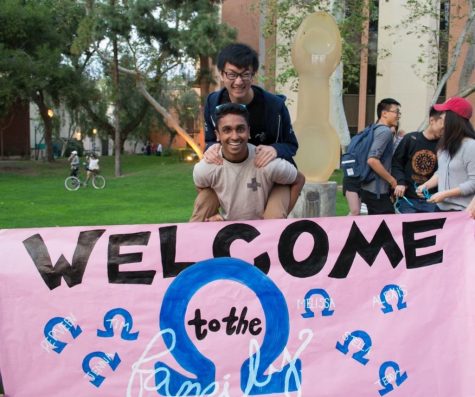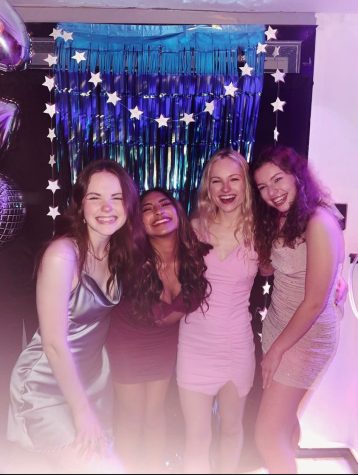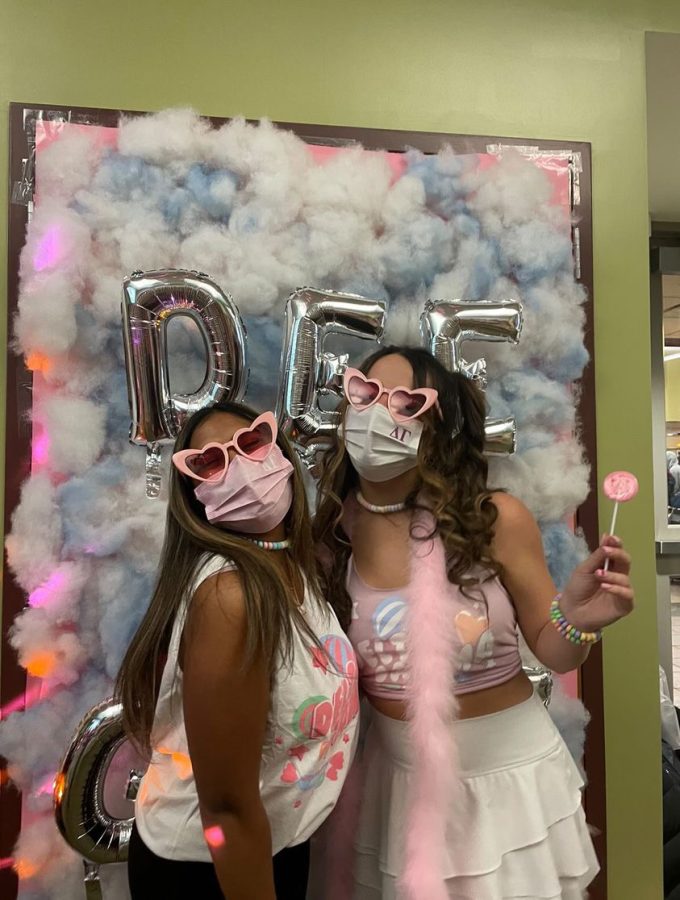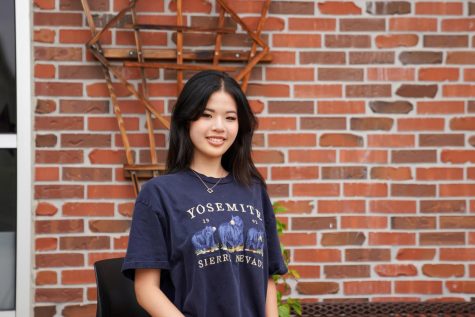Fraternity and sorority culture
MVHS alumni share their experiences with Greek Life
Anika Deshpande poses with her friend at a sorority event. Photo courtesy of Anika Deshpande | Used with Permission
October 13, 2022
It was a rainy evening, so MVHS alum ‘21 Anika Deshpande and eight other new Delta Gamma members huddled inside Penn State University’s science building to take pictures with the group. Clad in their sparkly purple-pink, white and gold dresses, the colors seemed to reflect off the walls as the laughter echoed throughout the room. Deshpande says this was one of her favorite memories with her sorority sisters.
“I think one nice thing about that was we were all able just to spend time together and really get to know each other,” Deshpande said. “It was really fun getting ready for a homecoming dance, and taking pictures with all your friends.”
Deshpande rushed, or auditioned for various sororities, by attending events during her freshman year. Because her sister had also been part of a sorority, Deshpande knew how the recruitment process worked and what sorority she wanted to join. Due to the pandemic, Deshpande recalls the process involved two rounds of online communication and two in person.
“Rush was two weeks long,” Deshpande said. “It was in the spring semester, so we did it in January. The rush process is fairly simple, you talk to different houses, and each round is a different topic. [For example], one round will be [about] the values of each sorority, one round has their philanthropy and then the last round is preference, or [a] sisterhood round.”
In joining, Deshpande hoped to find a community among the 30,000 undergraduates who attended her university. Deshpande also joined in hopes of participating in school events that Greek life plays a large role in.
“We have a very specific school-wide philanthropy called THON,” Deshpande said. “It’s a 46 hour dance marathon to raise money for children with cancer. Greek life is a very big part of THON, and it’s one of the best ways to get involved with it.”
On the other hand, MVHS alum ‘13 Siddharth Manoj joined the service fraternity Alpha Phi Omega at USC, which he describes as similar to Key Club at MVHS. This fraternity is for individuals who want to perform acts of service both in and out of school. Manoj volunteered as a tutor at an underserved elementary school near USC.
“I specifically tutored this one kid [in fourth grade] who I remember was really struggling when he first [started school],” Manoj said. “He was very rowdy and would not listen to anyone the first time I got there. I was like, ‘OK, this is terrible.’ But then after two or three months, I felt like I was making a difference because he started to get better at what he was doing. He was actually listening to some of the advice that I was giving him. I think he was slowly learning and picking up on a lot of that.”

In addition to service, Manoj explains that by meeting like-minded and selfless people in his fraternity, he was able to create genuine friendships. One of his favorite memories was when members of his fraternity went to a Porter Robinson concert during his sophomore year.
“We all met up, hung out, got dinner [and] went to [the concert] because it’s nice to do stuff that’s outside of school and the fraternity itself,” Manoj said. “[During the concert], we started singing along to the [songs we knew] and I it was cool to make [that] connection because it’s really easy to meet people [and] get coffee, but when you share an interest and you get really deep into that interest, I think it’s a memory that you don’t forget.”
 MVHS alum ‘21 Christy Feng, who was part of Kappa Alpha Theta at the University of Washington initially decided to join a sorority because she wanted to expand her social circle. However, after a period of time Feng decided to leave because she felt that her priorities did not align with other members of her sorority.
MVHS alum ‘21 Christy Feng, who was part of Kappa Alpha Theta at the University of Washington initially decided to join a sorority because she wanted to expand her social circle. However, after a period of time Feng decided to leave because she felt that her priorities did not align with other members of her sorority.
“In Monta Vista, everyone was pushing each other to challenge themselves academically,” Feng said. “I don’t really see that [at the sorority], and in Monta Vista, there’s very much a go-getter attitude about your future and your aspirations. [In the sorority], there was just a different prioritization on other aspects of life, other than academics, which is totally fine. I just prefer a [more] work hard and play hard [mentality].”
Deshpande believes there are misconceptions about sororities as some sororities focus on social aspects more than academics. She says while a lot of people think that the girls in sororities only join for partying, everyone she’s met through her sorority has been “well-rounded and hardworking.”
“There’s a GPA requirement to be in [the sorority and] we have the second highest GPA on campus for sororities and fraternities,” Deshpande said. “You have to fill out an application when you are going through rush and they’ll ask about GPA, community service and [philanthropy]. [Also], a lot of people in my sorority are in very difficult majors and still manage to keep a high GPA and do a lot of other extracurriculars too.”

According to Feng, being in a sorority also comes with particular obligations, such as maintaining a certain image. In her sorority, all members were prohibited from posting explicit content across all social media platforms. Feng stated that these rules also protected her, since they prevented uncomfortable situations when it came to employers as most jobs check employee’s social media before hiring them. Although Feng found these rules restrictive at times, she believes that it did do more good than harm since they helped portray her in a better light professionally.
In other instances, Deshpande notes that alumni that were part of the sorority would be in positions where they are allowed to reference or hire people, and reached out to members of her sorority to ask if anyone was interested. Delta Gamma’s alumni network grants Deshpande and other members opportunities that would be much more competitive to get if they weren’t part of the sorority.
“One of the main reasons people go to college is not only a degree but the networking opportunities, and I think that being in a sorority opens up your network,” Deshpande said. “We have chapter advisors who are professionals, and they give recommendations for jobs and [other opportunities]. It also helps you be a more well rounded person and a [stronger] candidate because you have to do training on how to [recruit] people and that helps you [become] more well spoken.”
Both Manoj and Deshpande encourage students to rush fraternities and sororities if they are interested, due to their personal experiences.
“Being in a sorority is definitely a positive experience,” Deshpande said. “I think there’s a lot of stigma around it and oftentimes people dismiss it, [but] if you’re on the fence about it, I would say go through recruitment. If you don’t like it, you’re not tied down to finishing recruitment, which is really nice. I know it sounds cheesy, but you’ll end up where you’re supposed to and for the most part it worked out for [everyone I know].”


















